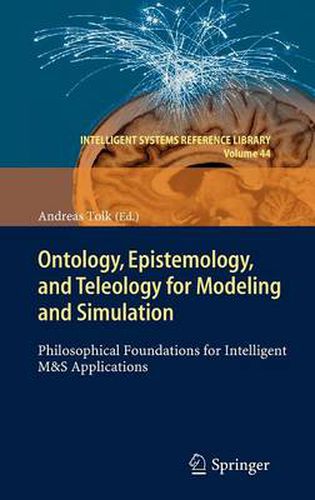Readings Newsletter
Become a Readings Member to make your shopping experience even easier.
Sign in or sign up for free!
You’re not far away from qualifying for FREE standard shipping within Australia
You’ve qualified for FREE standard shipping within Australia
The cart is loading…






This title is printed to order. This book may have been self-published. If so, we cannot guarantee the quality of the content. In the main most books will have gone through the editing process however some may not. We therefore suggest that you be aware of this before ordering this book. If in doubt check either the author or publisher’s details as we are unable to accept any returns unless they are faulty. Please contact us if you have any questions.
In this book, internationally recognized experts in philosophy of science, computer science, and modeling and simulation are contributing to the discussion on how ontology, epistemology, and teleology will contribute to enable the next generation of intelligent modeling and simulation applications.
It is well understood that a simulation can provide the technical means to display the behavior of a system over time, including following observed trends to predict future possible states, but how reliable and trustworthy are such predictions? The questions about what we can know (ontology), how we gain new knowledge (epistemology), and what we do with this knowledge (teleology) are therefore illuminated from these very different perspectives, as each experts uses a different facet to look at these challenges. The result of bringing these perspectives into one book is a challenging compendium that gives room for a spectrum of challenges: from general philosophy questions, such as can we use modeling and simulation and other computational means at all to discover new knowledge, down to computational methods to improve semantic interoperability between systems or methods addressing how to apply the recent insights of service oriented approaches to support distributed artificial intelligence.
As such, this book has been compiled as an entry point to new domains for students, scholars, and practitioners and to raise the curiosity in them to learn more to fully address the topics of ontology, epistemology, and teleology from philosophical, computational, and conceptual viewpoints.
$9.00 standard shipping within Australia
FREE standard shipping within Australia for orders over $100.00
Express & International shipping calculated at checkout
This title is printed to order. This book may have been self-published. If so, we cannot guarantee the quality of the content. In the main most books will have gone through the editing process however some may not. We therefore suggest that you be aware of this before ordering this book. If in doubt check either the author or publisher’s details as we are unable to accept any returns unless they are faulty. Please contact us if you have any questions.
In this book, internationally recognized experts in philosophy of science, computer science, and modeling and simulation are contributing to the discussion on how ontology, epistemology, and teleology will contribute to enable the next generation of intelligent modeling and simulation applications.
It is well understood that a simulation can provide the technical means to display the behavior of a system over time, including following observed trends to predict future possible states, but how reliable and trustworthy are such predictions? The questions about what we can know (ontology), how we gain new knowledge (epistemology), and what we do with this knowledge (teleology) are therefore illuminated from these very different perspectives, as each experts uses a different facet to look at these challenges. The result of bringing these perspectives into one book is a challenging compendium that gives room for a spectrum of challenges: from general philosophy questions, such as can we use modeling and simulation and other computational means at all to discover new knowledge, down to computational methods to improve semantic interoperability between systems or methods addressing how to apply the recent insights of service oriented approaches to support distributed artificial intelligence.
As such, this book has been compiled as an entry point to new domains for students, scholars, and practitioners and to raise the curiosity in them to learn more to fully address the topics of ontology, epistemology, and teleology from philosophical, computational, and conceptual viewpoints.